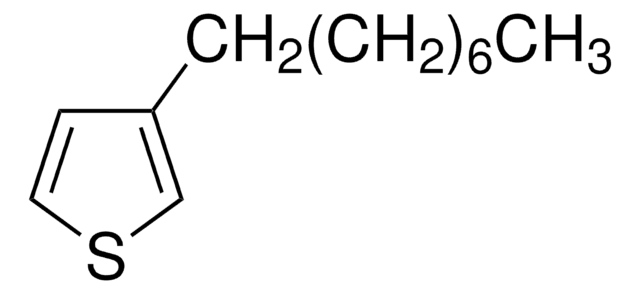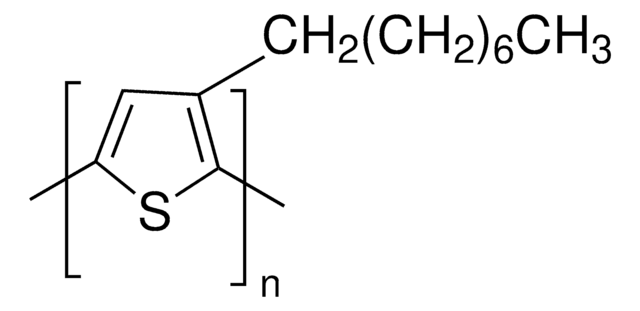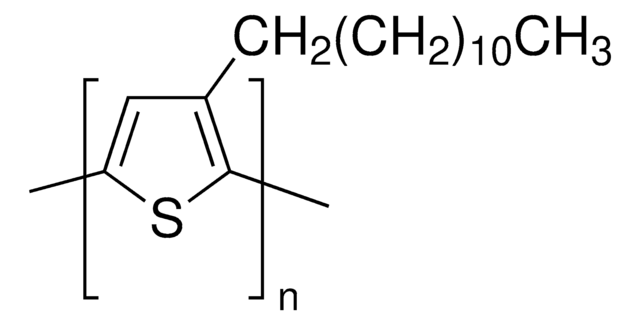About This Item
Empirický vzorec (Hillův zápis):
C16H28S
Číslo CAS:
Molekulová hmotnost:
252.46
MDL number:
UNSPSC Code:
12352103
PubChem Substance ID:
NACRES:
NA.23
Doporučené produkty
assay
97%
refractive index
n20/D 1.488 (lit.)
bp
290 °C (lit.)
density
0.902 g/mL at 25 °C (lit.)
storage temp.
2-8°C
SMILES string
CCCCCCCCCCCCc1ccsc1
InChI
1S/C16H28S/c1-2-3-4-5-6-7-8-9-10-11-12-16-13-14-17-15-16/h13-15H,2-12H2,1H3
InChI key
RFKWIEFTBMACPZ-UHFFFAOYSA-N
Související kategorie
General description
3-Dodecylthiophene (3-DT) is a conjugating monomer that can be used as an active layer on semiconductors. It has good electronic properties and can be used in the development of p-type semiconducting polymers. It is mainly used in the formation of poly(3-dodecylthiophene) (P3DT) through electrochemical polymerization. P3DT can further be utilized for a variety of organic electronic based applications.
Application
Conducting polymer precursor.
Storage Class
10 - Combustible liquids
wgk_germany
WGK 3
flash_point_f
Not applicable
flash_point_c
Not applicable
ppe
Eyeshields, Gloves
Osvědčení o analýze (COA)
Vyhledejte osvědčení Osvědčení o analýze (COA) zadáním čísla šarže/dávky těchto produktů. Čísla šarže a dávky lze nalézt na štítku produktu za slovy „Lot“ nebo „Batch“.
Již tento produkt vlastníte?
Dokumenty související s produkty, které jste v minulosti zakoupili, byly za účelem usnadnění shromážděny ve vaší Knihovně dokumentů.
Subthreshold characteristics of field effect transistors based on poly (3-dodecylthiophene) and an organic insulator
Scheinert S, et al.
Journal of Applied Physics, 92(1), 330-337 (2002)
Controlled charge transport by polymer blend dielectrics in top-gate organic field-effect transistors for low-voltage-operating complementary circuits
Baeg K, et al.
ACS Applied Materials & Interfaces, 4(11), 6176-6184 (2012)
Nuclear magnetic resonance studies on electrochemically prepared poly (3-dodecylthiophene)
Sato M and Morii H
Macromolecules, 24(5), 1196-1200 (1991)
Hiro Minamimoto et al.
Nanoscale, 13(3), 1784-1790 (2021-01-13)
Plasmon-induced chemical reactions triggered by near-infrared light illumination might enable efficient photo energy conversion. Here, electrochemical oxidative polymerization of a conductive polymer was conducted on plasmonic photoconversion electrodes. The absolute electrochemical potential of the generated holes was estimated from the
Journal of the American Chemical Society, 117, 233-233 (1995)
Náš tým vědeckých pracovníků má zkušenosti ve všech oblastech výzkumu, včetně přírodních věd, materiálových věd, chemické syntézy, chromatografie, analytiky a mnoha dalších..
Obraťte se na technický servis.

![(3aS,4R,5S,6aR)-(+)-Hexahydro-5-hydroxy-4-(hydroxymethyl)-2H-cyclopenta[b]furan-2-one 98%](/deepweb/assets/sigmaaldrich/product/structures/235/039/9577fbe5-13a7-4410-b9c4-02727c3da799/640/9577fbe5-13a7-4410-b9c4-02727c3da799.png)





